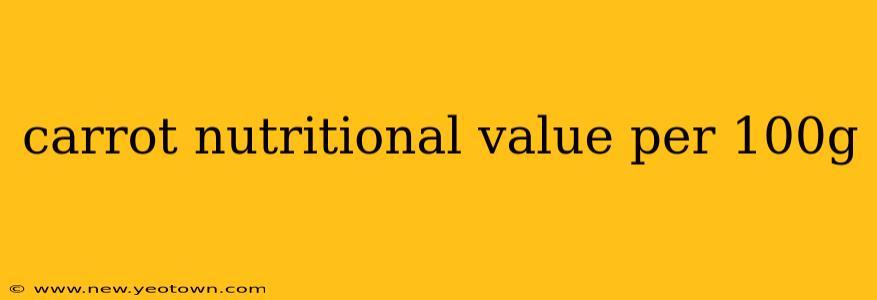The Humble Carrot: A Nutritional Powerhouse Packed in 100g
Carrots. The vibrant orange root vegetable we often associate with childhood, bunny rabbits, and maybe even a touch of blandness. But beneath that simple exterior lies a nutritional powerhouse, bursting with vitamins, minerals, and beneficial compounds. Let's delve into the surprising nutritional value packed into just 100g of this everyday wonder.
What are the Vitamins and Minerals in 100g of Carrots?
A typical 100g serving of raw carrots provides a surprisingly diverse array of essential nutrients. We're not just talking about beta-carotene (which our bodies convert into Vitamin A), although that's a significant component. Think also of Vitamin K1, crucial for blood clotting and bone health; potassium, important for maintaining healthy blood pressure; and a decent dose of Vitamin C, a powerful antioxidant. Beyond these, you'll also find smaller but still significant amounts of Vitamin B6, pantothenic acid, and folate. And let's not forget the minerals – carrots contribute manganese, magnesium, and even a touch of copper to your daily intake.
How Many Calories are in 100g of Carrots?
This is where carrots truly shine for those watching their calorie intake. 100g of raw carrots clocks in at a mere 41 calories. This low-calorie density makes them a fantastic addition to any weight-management plan, allowing you to enjoy a substantial volume of food while keeping your calorie count low. This is further enhanced by their high fiber content, which promotes satiety and helps regulate digestion.
What are the Health Benefits of Eating Carrots?
The nutritional profile translates directly into a range of health benefits. The high beta-carotene content is well-known for its role in supporting eye health, potentially reducing the risk of age-related macular degeneration and cataracts. The fiber content aids in digestive health, preventing constipation and promoting a healthy gut microbiome. The antioxidants present combat free radical damage, potentially reducing the risk of chronic diseases like heart disease and certain cancers. Furthermore, the potassium content contributes to maintaining healthy blood pressure levels.
Are Cooked Carrots as Nutritious as Raw Carrots?
While cooking carrots makes them softer and easier to digest, it does lead to some nutrient loss, particularly Vitamin C. However, cooking methods can influence this. Steaming is generally considered to preserve more nutrients than boiling, which can leach vitamins into the cooking water. Ultimately, both cooked and raw carrots offer substantial health benefits; it really comes down to personal preference and culinary needs.
What are some creative ways to incorporate more carrots into my diet?
Beyond the traditional side dish, there are countless ways to enjoy carrots. Grate them into salads, soups, or stir-fries for a boost of sweetness and crunch. Juice them for a refreshing and nutrient-rich drink. Roast them with herbs and spices for a flavorful and satisfying snack. Puree them into smoothies or add them to homemade bread or muffins. The possibilities are truly endless!
Are there any potential downsides to eating too many carrots?
While carrots are generally very safe, consuming excessive amounts can lead to carotenemia, a condition causing a yellowish tinge to the skin. This is harmless and usually resolves itself once carrot consumption returns to normal levels. Furthermore, individuals with certain allergies might experience reactions, although this is relatively rare.
In conclusion, the humble carrot is much more than just a crunchy orange vegetable. A 100g serving offers a concentrated burst of essential vitamins, minerals, and beneficial compounds, contributing significantly to overall health and wellbeing. Incorporate them into your daily diet in creative ways to reap their plentiful rewards.

